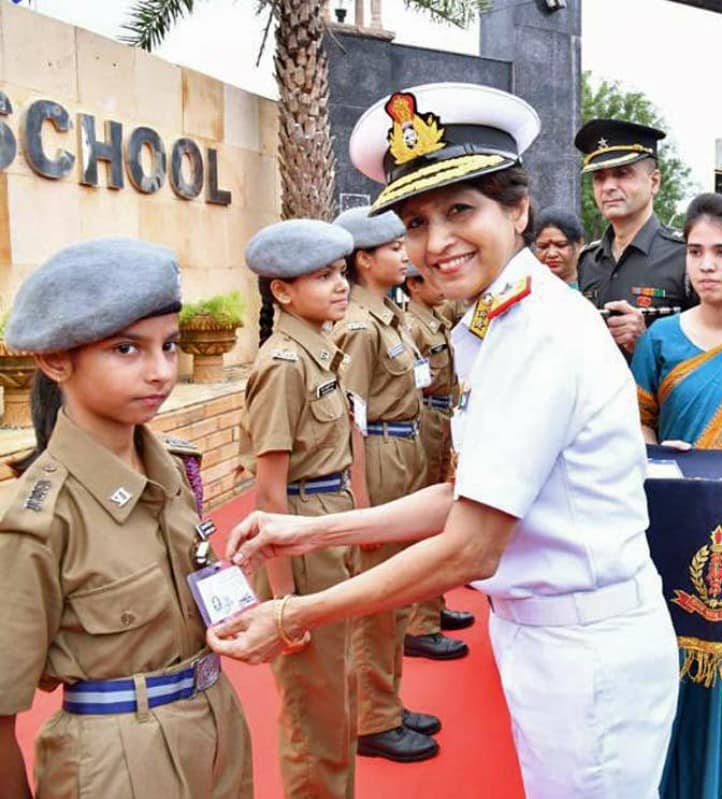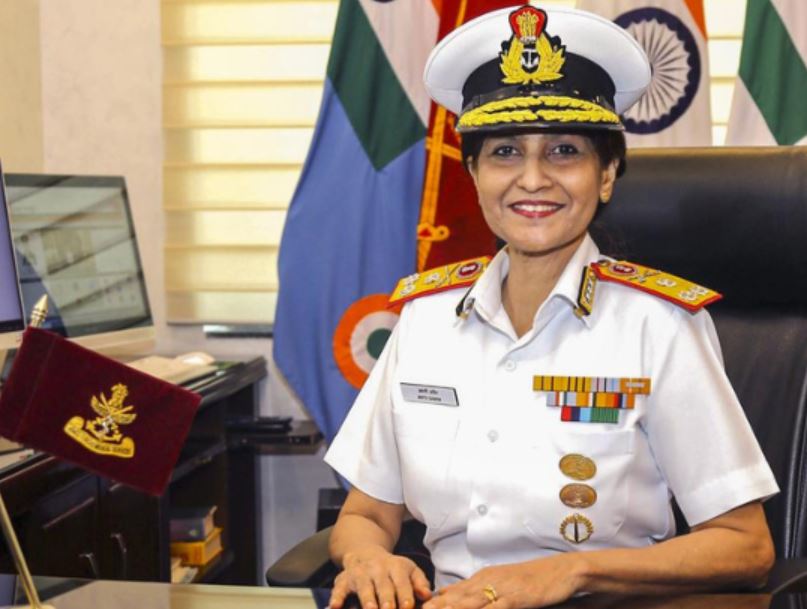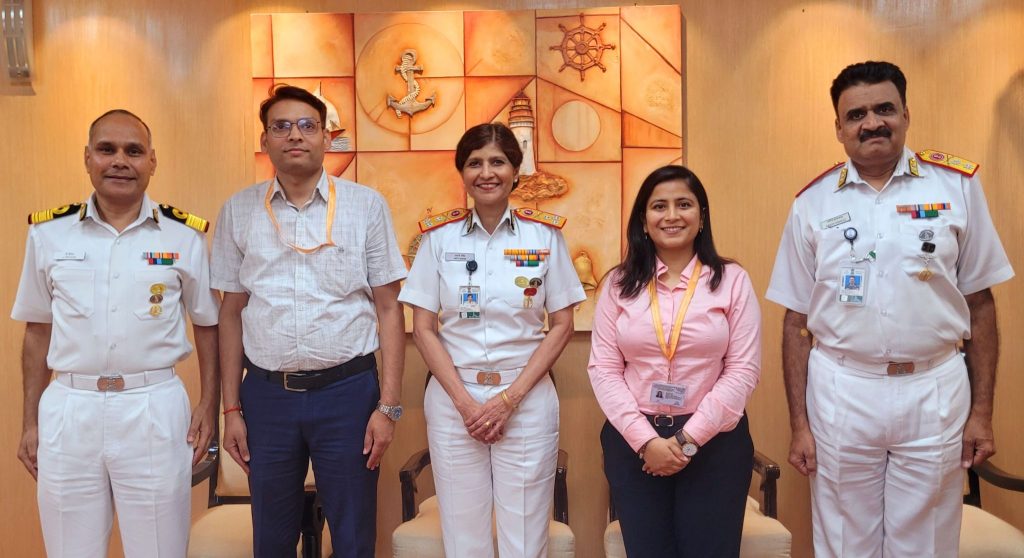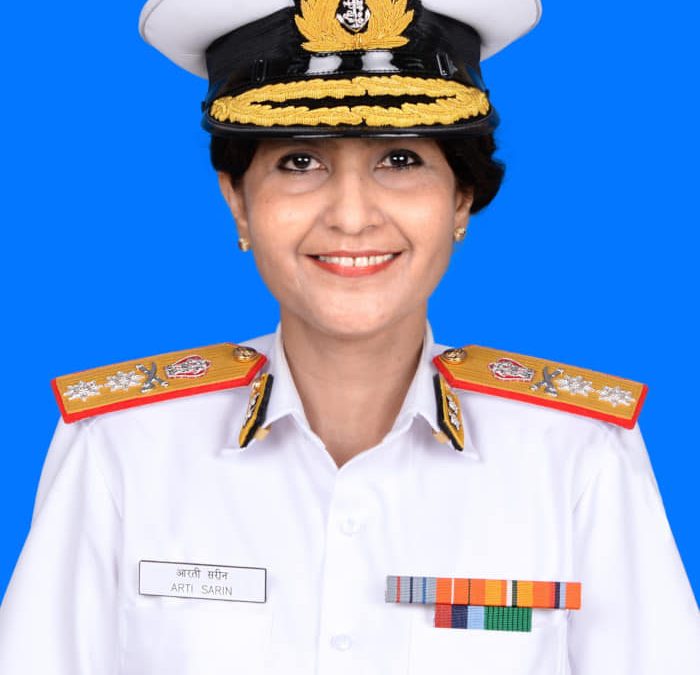In a landmark moment for the Indian Navy, Vice Admiral Dr. Arti Sarin made history as the first woman officer to be appointed as the Deputy Chief of Naval Staff (DCNS) in 2023. A pioneer in a traditionally male-dominated field, Vice Admiral Sarin’s appointment is a significant milestone in the journey toward gender equality within the Indian armed forces. With her exceptional blend of academic acumen, leadership experience, and strategic vision, Dr. Sarin continues to redefine the role of women in India’s defense sector.
A remarkable career trajectory:
Dr. Arti Sarin’s career in the Indian Navy spans over three decades, during which she has held several key leadership positions, demonstrating an unwavering commitment to excellence and service. An officer in the Indian Navy’s medical branch, Vice Admiral Sarin began her journey by joining the Navy’s Medical Corps, where she underwent rigorous training and was commissioned as a doctor. What sets her apart from many others in her field is her highly specialized education and expertise, which go beyond the traditional roles typically assigned to naval medical officers.
She holds a medical degree, along with a postgraduate qualification in preventive and social medicine, and has an impressive academic background that includes specialized training in high-level military medicine. This broad education allowed Vice Admiral Sarin to make substantial contributions to the Navy’s medical infrastructure, particularly in areas related to health management, mental well-being, and preventive healthcare in challenging maritime conditions.

Her career trajectory is notable not only for her academic achievements but also for the leadership roles she assumed, culminating in her appointment as the Deputy Chief of Naval Staff (DCNS). Prior to her current position, she held key posts such as Principal Medical Officer at naval establishments and Senior Medical Officer at various operational commands, where her strategic input helped shape the healthcare framework for naval personnel.
Leadership in Medical and Operational Roles:
Throughout her career, Vice Admiral Sarin has displayed extraordinary leadership in both operational and administrative roles. As the Director-General of the Navy’s medical services, she was responsible for overseeing the health and well-being of thousands of personnel deployed across the nation and on board ships at sea. Her leadership in this capacity was crucial during the COVID-19 pandemic, where she played an instrumental role in managing the health protocols for the Navy, ensuring the safety of naval personnel while continuing to maintain operational readiness.
Her leadership extended to the Navy’s overall health strategy, where she was a key figure in improving mental health services, especially considering the unique stressors that naval personnel face. Vice Admiral Sarin focused on creating support systems that addressed not only physical health but also mental resilience, an area that is increasingly becoming critical in military environments.
Dr. Sarin also worked tirelessly to modernize the Navy’s medical infrastructure, introducing more efficient systems for health monitoring, treatment protocols, and emergency medical care. Her strategic thinking and ability to oversee large-scale operations were critical in ensuring that the Navy’s medical services could keep pace with the evolving needs of the service.
Breaking Gender Barriers:
Dr. Sarin’s ascension to the rank of Vice Admiral is a testament to her competence, vision, and the barriers she has broken as a woman in the Indian Navy. The military, and particularly the Indian Navy, has long been seen as an institution where women had limited representation in leadership roles. However, over the last few decades, women like Vice Admiral Sarin have worked tirelessly to break these barriers, proving that leadership in defense is not determined by gender but by skill, determination, and commitment to national service.

As one of the highest-ranking women officers in the history of the Indian Navy, Dr. Sarin’s appointment as DCNS is seen as a significant step forward for gender inclusion within the armed forces. Her achievement comes at a time when women’s roles in defense services are expanding, with more women being inducted into various branches of the military, including combat and leadership positions. Vice Admiral Sarin’s rise is not only an inspiration for women officers in the Navy but also sets an example for young girls aspiring to serve their country in any capacity, particularly in defense.
Her leadership in a top-tier naval role challenges the prevailing norms, sending a strong message about the need for diversity and the importance of empowering women in high-ranking positions. It highlights the Navy’s commitment to recognizing talent regardless of gender and ensuring that capable individuals, irrespective of their background, can rise through the ranks.
Contributions to Naval Strategy and Policy:
Vice Admiral Sarin’s strategic vision extends beyond medical services to include contributions to broader naval policy. As DCNS, she is actively involved in shaping the Navy’s strategic goals, ensuring that the organization remains agile and responsive to the modern challenges of defense. With the growing complexity of maritime security, Vice Admiral Sarin’s insights into the holistic management of naval operations—combining health, personnel, and tactical readiness—are invaluable.
Her experience also extends to the modernization of naval infrastructure and technology. She has been instrumental in advocating for enhanced medical support systems for the Navy’s increasingly sophisticated operational requirements. This includes the development of telemedicine facilities, advanced medical equipment for ships, and the integration of digital health solutions that ensure better health management on and off the field.

In her role as DCNS, Vice Admiral Sarin also provides crucial input into the Navy’s long-term planning and policy development. The Navy’s future depends not just on its tactical capabilities but also on the well-being of its personnel. Sarin’s work aims to ensure that the Navy remains not only operationally ready but also resilient, ensuring the long-term health and efficiency of its personnel.
Mentorship and Inspiration:
Beyond her professional achievements, Vice Admiral Sarin is also an advocate for mentorship and gender equality in the workplace. Throughout her career, she has mentored numerous women officers and provided them with guidance on navigating the unique challenges of a military career. Sarin’s success and leadership have paved the way for many women to follow in her footsteps, particularly in leadership roles within the armed forces.
Her advocacy for gender inclusivity within the Navy has played a significant role in encouraging more women to pursue careers in the military. Through her mentorship, she has made a concerted effort to ensure that women have access to the same career opportunities, professional development resources, and leadership pathways as their male counterparts.
As a role model, Dr. Sarin continues to inspire the next generation of women officers to excel, not only in medical fields but across all sectors of the Navy. Her story is one of resilience, overcoming challenges, and continuously pushing for excellence.
Legacy and Future Vision:
Vice Admiral Dr. Arti Sarin’s leadership is not only defined by her individual achievements but also by the legacy she is creating for the future of the Indian Navy. Her advocacy for women’s inclusion in the defense sector, her contributions to improving healthcare for naval personnel, and her strategic leadership will undoubtedly continue to shape the Navy for years to come.
With her position as DCNS, Dr. Sarin is poised to lead the Navy through some of its most crucial moments in history, making lasting contributions to the strategic direction of India’s maritime defense.
Conclusion:
Vice Admiral Dr. Arti Sarin’s appointment as the Deputy Chief of Naval Staff is a significant achievement, not only for her but also for the Indian Navy and the larger defense sector. A leader, innovator, and trailblazer, she has shown that women are not just capable of leading in military roles but can shape the future of the armed forces.
As per vamaindia.in, her legacy will serve as an inspiration for generations to come, demonstrating that success in the Indian Navy, or any military service, is a matter of dedication, leadership, and vision—attributes that transcend gender.


